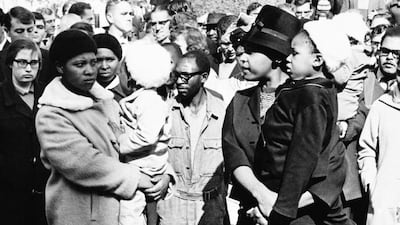Muhammad Ali once famously said: "Service to others is the rent you pay for your room here on Earth.” On September 5, 1960, the late boxer and activist won a gold medal at the Rome Olympics. The passing of this week’s seemingly unremarkable date is in contrast to a remarkable man.
Ali’s service in and outside the ring left a role model’s legacy decades on from that pivotal moment. His boxing prowess was just one element of his status alongside his conscientious objection to the Vietnam War – for which he lost his world champion status – along with his lyricism and invention of today’s “trash talk”, and his ability to articulate right and wrong. It’s little wonder that his funeral in 2016 was watched by a billion people, exceeded only by the services for Queen Elizabeth and Princess Diana.
It feels like a double punch in the gut (pun intended) that his pivotal date coincides with the death anniversary of Mother Teresa, another global role model, revered for her service over decades to the poor of India.
This is because we are faced with the question, where are the role models that we need today? We live in a period of conflict, revolution and death on a scale our brains can’t compute. Climate change poses a threat and many worry about a possible Third World War on the horizon. All these challenges are wrapped up in an era of misinformation, disinformation and the muddying of what once appeared to be a consensus on moral values.
It is reasonable to consider that this dearth of larger-than-life heroes is, in part, down to the fact that the moral clarity to even identify who such people might be seems murkier than ever. After all, earlier this year, in response to an order from a judge to stop Donald Trump’s verbal abuse during a court case, the now convicted former US president offered himself as a “modern-day Mandela” fighting for free speech. Andrew Tate, considered a role model for “alpha males”, is seen as fighting back against the weakening of men, yet he is also under arrest for rape and human trafficking.
Role models in this sense seem not to need moral purpose, just large numbers of followers built on controversial viewpoints and exacerbated by algorithms.
It is challenging to know if the world could have another Nelson Mandela in the digital age. For every action or statement made by a public figure is subjected to immediate and often relentless scrutiny. This isn’t to say that role models from the earlier times did not polarise opinion. But social media platforms amplify both admiration and criticism of today’s leaders, making it difficult for them to maintain an unblemished public image.
But I’m not despondent. The process of blurring out role models who challenge authority is itself part of the role model’s creation. We don’t always recognise their heroic status at the time. They were controversial, anger was whipped up about them, they were insulted and persecuted, and considered fringe and disruptive in their times. Their myths are often post-hoc. And so it will be for the role models that are being nurtured now.
This century has also seen a shift from singular people as role models to collective movements and collective leadership. Campaigns such as MeToo and Black Lives Matter, as well as the protest camps on university campuses in the US and elsewhere about the war in Gaza, have been collective rather than individualised. But clearly, within these collectives are visionary people.
It’s not all about the online space; people are out in the real world, doing things. We just may not be attuned to it. Perhaps, they are not adequately covered in mainstream media, and probably edged out by the online algorithms.
Building role model status takes hard graft and long engagement – anathema to our digital age of short attention spans, fragmentation of public focus and the existence of echo chambers. Yet if we think of cultural figures such as Mahmoud Darwish, Umm Kulthum and Fairuz, we can be certain that they would have burst out of the corners of TikTok and Instagram. We know that today’s equivalent of the real-world halls of Malcolm X and Martin Luther King Jr are still full of people hungry to fight for equality and overturn injustice.
The streets have been filled with millions of people fighting to save the planet, for racial equality and for peace and self-determination in Palestine, among other causes.
Not all role models need to be global figures. Community leaders, grassroots activists, and even parents can inspire and drive change within their own spheres. It is also common for people to say their role model is their mum or dad – it is something I’ve said myself. September 5 also marks Teacher’s Day in many countries, a reflection on how educators change lives.
Of course, there is always the ultimate option when it comes to seeking leadership and role models. Which is to step up ourselves. To quote Ali: “We become heroes when we stand up for what we believe in.”























